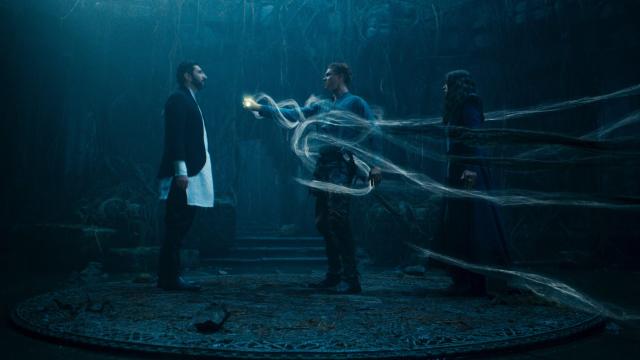The first season of Prime Video’s Wheel of Time series ended last week, and as I watched the finale I had a strange revelation: Despite the infinite things I dislike about the show, I somehow still like the show. And the reason is that despite all the TV series’ many flaws, its many, many changes from the original source material fixes so many of the flaws of Robert Jordan’s original novels that I ended up feeling that the show is an overall improvement.
This will likely upset you if you’re a hardcore fan of the books, but guess what — the show was never for you. In a (weird) Q&A session on Twitter, showrunner Rafe Jenkins says he always knew mega-fans were going to dislike the adaptation: “When we started out, we knew the show had to appeal to a huge audience in order to justify its existence. So we always imagined that we’d likely lose absolute hardcore book fans who’re read the series multiple times because the show would be too different from the books. And conversely, that we’d lose people who’ve never watched a fantasy show before because it’s too much like the books (which are very high fantasy).”
That’s presumably true, although it hasn’t hurt The Wheel of Time at all — Jenkins also confirmed the show was “Amazon’s biggest premiere of all time, the most-watched show in the world for three weeks running, the completion rate is massive, and Eye of the World is back on the bestseller list.” That’s amazing, especially given there are so many problems with the series that might put those newcomers off: lacklustre set design, awkward direction, dodgy CG, some one-note performances, and just a general “second-rate Game of Thrones” vibe.
Those are some pretty intense problems, especially for a show that reportedly has a budget of $US10 ($14) million per episode. But they’re TV series problems, and not adaptation problems, if that makes sense. In terms of the adaptation, The Wheel of Time show has modernised, streamlined, and focused the sprawling, byzantine, and more-than-occasionally problematic narrative told by Jordan in the massive 14-book series. The show is easier to follow, which is a blessing when so many new, fantastical concepts get introduced in each episode. Tossing aside the novels’ obstinate adherence to the gender binary is a welcome and inclusive update. And even if some of the performances have issues, on the whole they’ve been solid — especially turns like Rosamund Pike as Moiraine and Daniel Henney’s Lan, who feel much better at bringing the emotionality of their characters to life than those characters felt on the page, to me (your mileage may vary).
But more to the point, the show pares away the books’ deadweight to let the genuinely compelling fantasy story at the heart of The Wheel of Time shine. The prophesied reincarnation of the person who literally broke the world in the past, but is also the only one who might be able to save it in the present, is a great premise, and the world that Jordan created all those years ago remains incredibly imaginative and fascinating, even as it draws on classic fantasy tropes.
In a way, The Wheel of Time TV series has the same issue as The Wheel of Time novels — it’s a captivating narrative obscured underneath a bevy of ultimately cosmetic problems. And in a way, that makes the show a more accurate and authentic adaptation than those hardcore fans might realise.
Gizmodo Australia recently sat down for a virtual chat at the inn in Gather with The Wheel of Time cast members Zoë Robins and Madeleine Madden, who play Nynaeve al’Meara and Egwene al’Vere. You can check it out over here.
